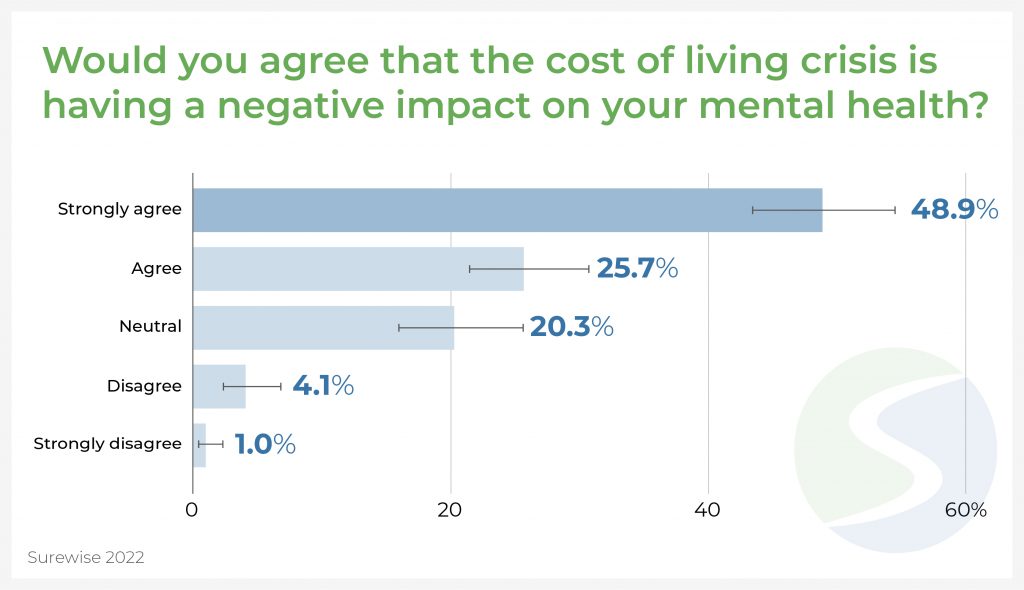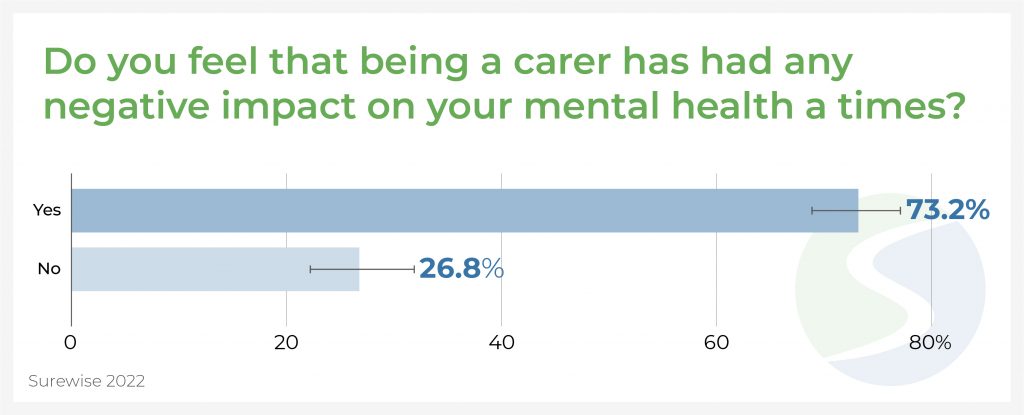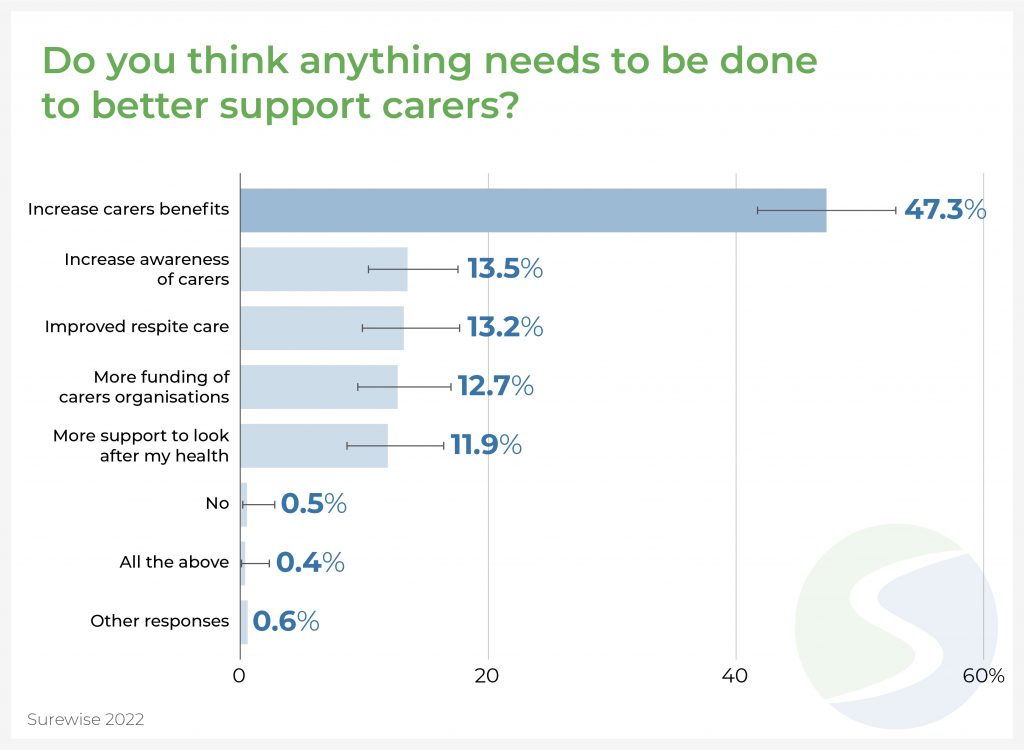Almost 1 in 2 carers agree that the current cost of living crisis has had a negative impact on their mental health, while 70% of carers surveyed are not confident they will make it financially through the next year, a recent survey from Surewise has revealed.
With millions of people facing economic uncertainty in face of the rising cost of living, we conducted this survey to reveal a true picture of the state of mental health among carers in the UK. While almost three-quarters of carers surveyed had experienced worsened mental health at times, perhaps more telling was the more pressing financial concerns so many carers expressed in this survey.
Key findings
- Mental health provision for carers is lacking. 73.2% of carers feel that being a carer has had a negative impact on their mental health at times.
- Carers are hit hard by the cost of living crisis. 74.6% of carers strongly agree or agree that the cost of living crisis has had a negative impact on their mental health.
- Money worries are a frequent theme. 69.8% of carers are not confident that they will be able to manage financially in the next year.
- Basic necessities are top on the list of financial cutbacks for carers. 65% of carers are cutting back on daily essentials such as food in response to the cost of living crisis, with 32% cutting into their savings.
Carers and mental health
One of our core findings from the survey was the detrimental effect caring, and being a carer within the cost of living crisis, is having on mental health. 73.2% of carers surveyed said they felt that being a carer has had a negative impact on their mental health at times.

Within the current context of the cost of living crisis – seeing housing costs, fuel, food, and more skyrocketing – almost three-quarters of carers (74.6%) agreed or strongly agreed that their mental health had worsened, with four in ten (41.6%) feeling that the biggest concern surrounding carers in the UK at this time is a lack of financial support.
“Research prior to the COVID-19 pandemic highlighted the lack of mental health provision for carers, and this study is demonstrating once again the urgent need for increased support for this sector,” comments Stuart Bensusan, Director of Surewise.
“Despite the hard work and sacrifices that carers, both paid and unpaid, make every single day, it’s also clear that there is a fundamental failure to provide financial support for those working in this sector.
Carers are already facing an increased burden of responsibility for the people they care for, with many unpaid carers reducing their income in order to do so. That the vast majority of carers are not sure how they will get through the next year is something that urgently needs to be addressed.”

65% of carers cutting back on essential spending
The survey revealed that 65% of carers are cutting back on essential items, such as food and heating, in response to the cost of living crisis. This is the number one thing carers report to be cutting down on due to rising costs.
60% were cutting back on hobbies and other leisure activities, while almost a third (32.8%) are cutting into their savings. Over a quarter or carers surveyed are borrowing or using credit – 16.4% are using credit cards in response to the cost of living crisis, while 11.4% have been forced to borrow money from family or friends.
That the vast majority are in a position where they are consciously using less energy and buying less food in order to afford to live speaks volumes. A shocking 69.8% of carers surveyed said they did not feel confident that they would be able to manage financially over the next year.
Support for carers
One key theme can be witnessed from this survey: the urgent need for increased financial provision for carers.
The majority (47.3%) of carers surveyed felt that increased carers benefits was the number one thing that needs to be done to better support carers in the UK. Interesting, despite three-quarters of carers agreeing that their mental health has been negatively impacted, just 11.9% felt they needed more support for mental health.

Likewise, when asked what their biggest concern regarding carers is at the time, just 13.9% stated a lack of mental health support. In contrast, 41.6% felt the biggest concern was a lack of financial support for carers.
“What we can see here is that while mental health is undeniably a concern for carers, the current climate of the UK is putting financial concerns at the forefront of every carer’s mind. With over two-thirds of carers worried how they’ll cope financially in the next year, it’s no surprise that a lack of financial support is the key thing carers feel needs addressing,” says Stuart Bensusan.
COVID-19’s impact
The COVID-19 pandemic highlighted the incredible commitment, sacrifice, and hard work of the NHS and carers in our society. However, our survey shows that more than half of carers surveyed (56.1%) felt that there had been no changes in support for carers since the pandemic.
Just 12.3% felt that support had improved – while almost a third of carers (31.6%) felt that support for carers has actually gotten worse since COVID-19.
The bottom line
There is an urgent need for increased support for carers in many different forms; chiefly, financial support and better provisions to alleviate the toll caring can take on one’s mental health. This all starts, however, with an increase in awareness on the difficulties carers within the UK face – something that we hope this survey helps do.
Methodology
This survey was commissioned by Surewise.com using Google Surveys to conduct the research. In total, the sample size was 2,709 adults aged 18+ and based in the UK, with the data collected between 29th September and 3rd October 2022. The survey was carried out online and meets Google Survey’s rigorous quality standards.